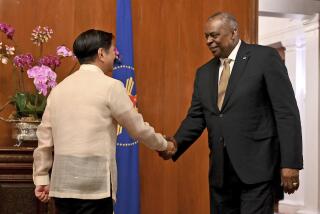Marcos Wants to Renegotiate U.S. Bases Agreement
- Share via
WASHINGTON — President Ferdinand E. Marcos of the Philippines, smarting from a rare Reagan Administration rebuke over reported election fraud, said Sunday that he wants to renegotiate an agreement that allows the United States to keep key military bases in the island nation.
Interviewed on the CBS program “Face the Nation,” Marcos asserted that Washington has failed to live up to its end of a 1983 bargain that promised $900 million in U.S. military and economic aid over a period of years, while ensuring American use of the strategic Subic Bay Naval Base and Clark Air Base on the main island of Luzon through 1991.
Meanwhile, three Senate Democrats returned from a weekend fact-finding mission in Manila and urged Reagan to suspend all aid to Marcos’ government and push him to resign after 20 years in power. One of the group, Sen. Carl Levin (D-Mich.), termed Marcos a “doomed dictator” whose continuation in office would imperil the future of the bases and push the strife-torn country into the hands of Communist insurgents.
The developments came after the National Assembly, which Marcos controls, proclaimed him the winner of a hotly disputed election battle with opposition candidate Corazon Aquino, who said the election was stolen from her. President Reagan then condemned the conduct of the election, saying that fraud and violence carried out primarily by Marcos’ supporters had “called into question” Marcos’ victory.
Although he denied the fraud charges, Marcos, 68, called Reagan’s statement “significant” and said he welcomed it, but did not explain why. But when asked about growing demands from members of Congress that U.S. aid to the Philippines be suspended because of the tainted election, Marcos reacted strongly.
“If that happens, we’ll have to talk about renegotiating the bases,” he declared. “ . . . even without the question of aid, we have to renegotiate those bases anyway.”
Such a suggestion by Marcos is not new or particularly worrisome to American officials. He often uses the bases as pawns when attempting to gain leverage in disputes with the United States, though he never has threatened to shut them down. The facilities rank as the second largest employer in the impoverished country and their elimination, while sometimes urged by anti-Marcos forces, would cause severe distress to the already battered Philippine economy.
Specifically, Marcos complained that, in implementing the bases accord, the U.S. had so far shorted his country by about $70 million in promised military aid. But, underlying the charge is a semantic dispute between Manila and Washington over whether money transfers should be considered rent for the bases or simply foreign aid. As such, Congress, reacting to critics of the corruption-laden Marcos military, shifted funds earmarked by Reagan for the Philippines armed forces to economic development programs.
Appearing on the same program, Salvador Laurel, Aquino’s vice-presidential running mate, said that his country needs American aid but suggested it should be deferred until Marcos leaves office.
“I would be the last person to ask for a cutoff of American aid to the Philippines because our people would suffer ultimately because of that,” Laurel said. “But I would not want to see American aid go to Marcos and end up perpetuating an unwanted regime, because that would really hurt Philippine-American relations.”
During the interview, Marcos ridiculed demands that he quit. “I’m not a dictator,” he insisted. “I’m not unwanted.”
Levin and two Democratic colleagues, Sens. David L. Boren or Oklahoma and David Pryor of Arkansas, returned to Washington from Manila with a different impression.
“The Marcos government has no credibility or legitimacy, and President Reagan should now urge Marcos to step down,” Levin said, echoing the sentiments of his colleagues.
More to Read
Sign up for Essential California
The most important California stories and recommendations in your inbox every morning.
You may occasionally receive promotional content from the Los Angeles Times.













